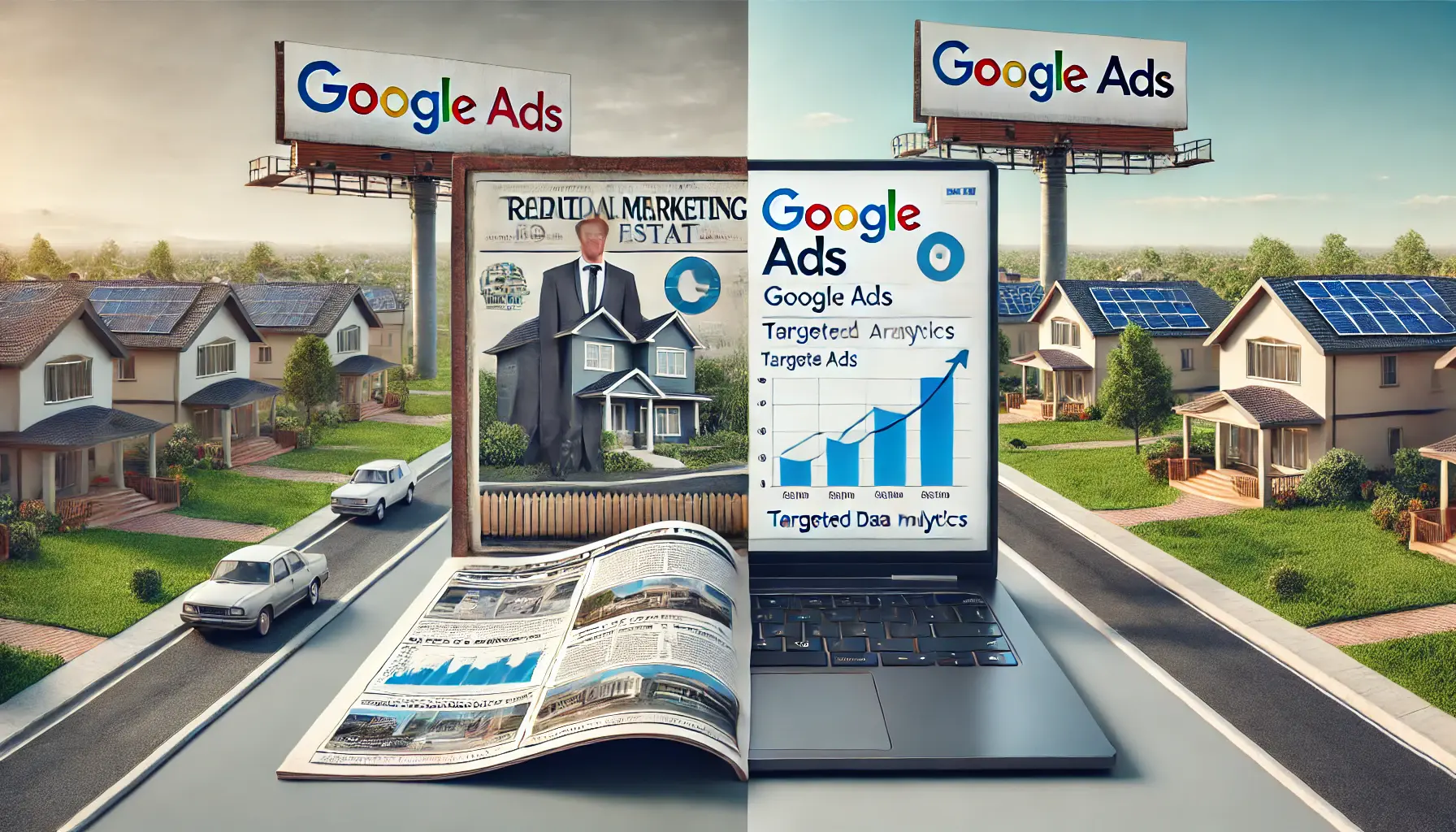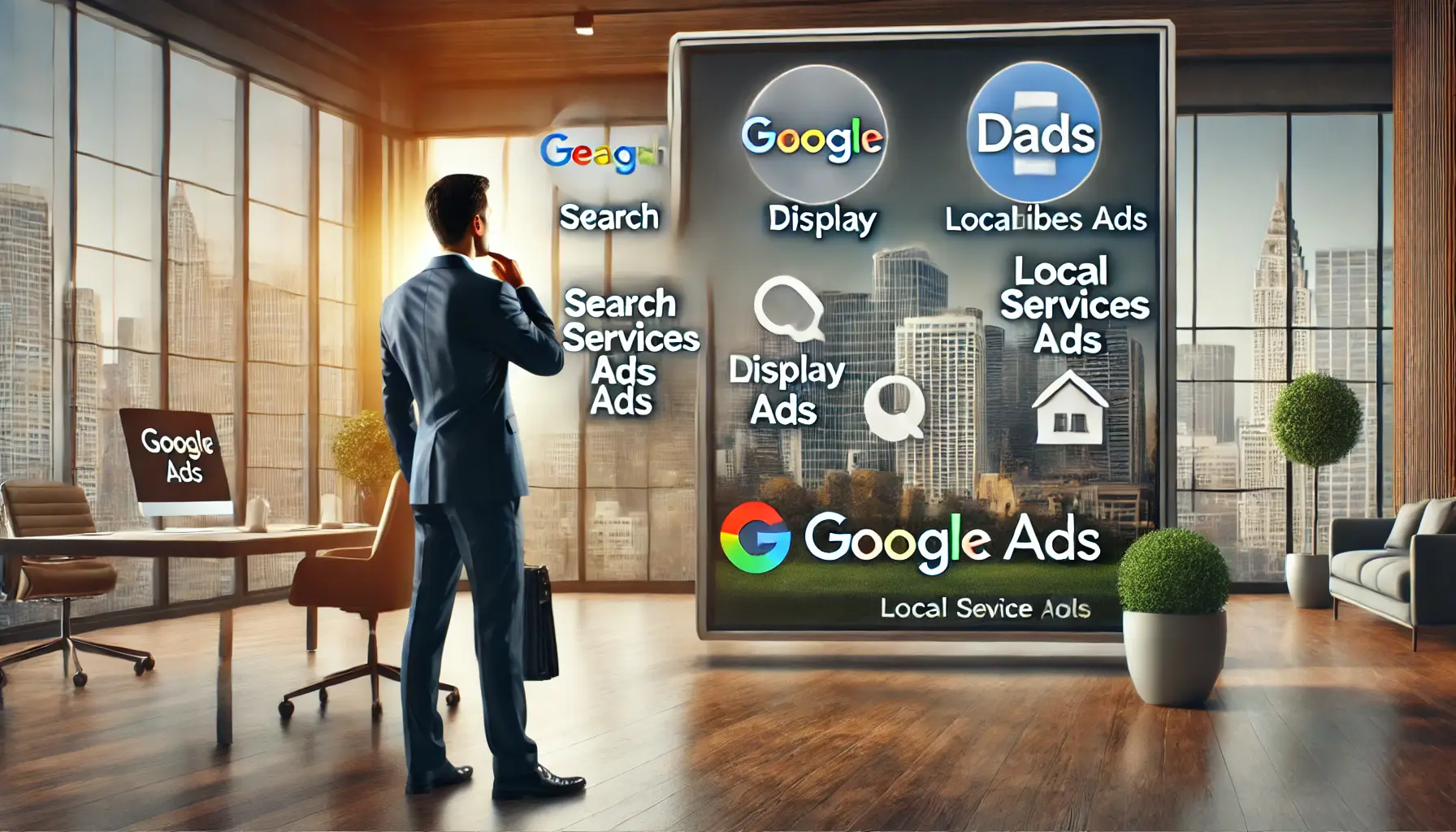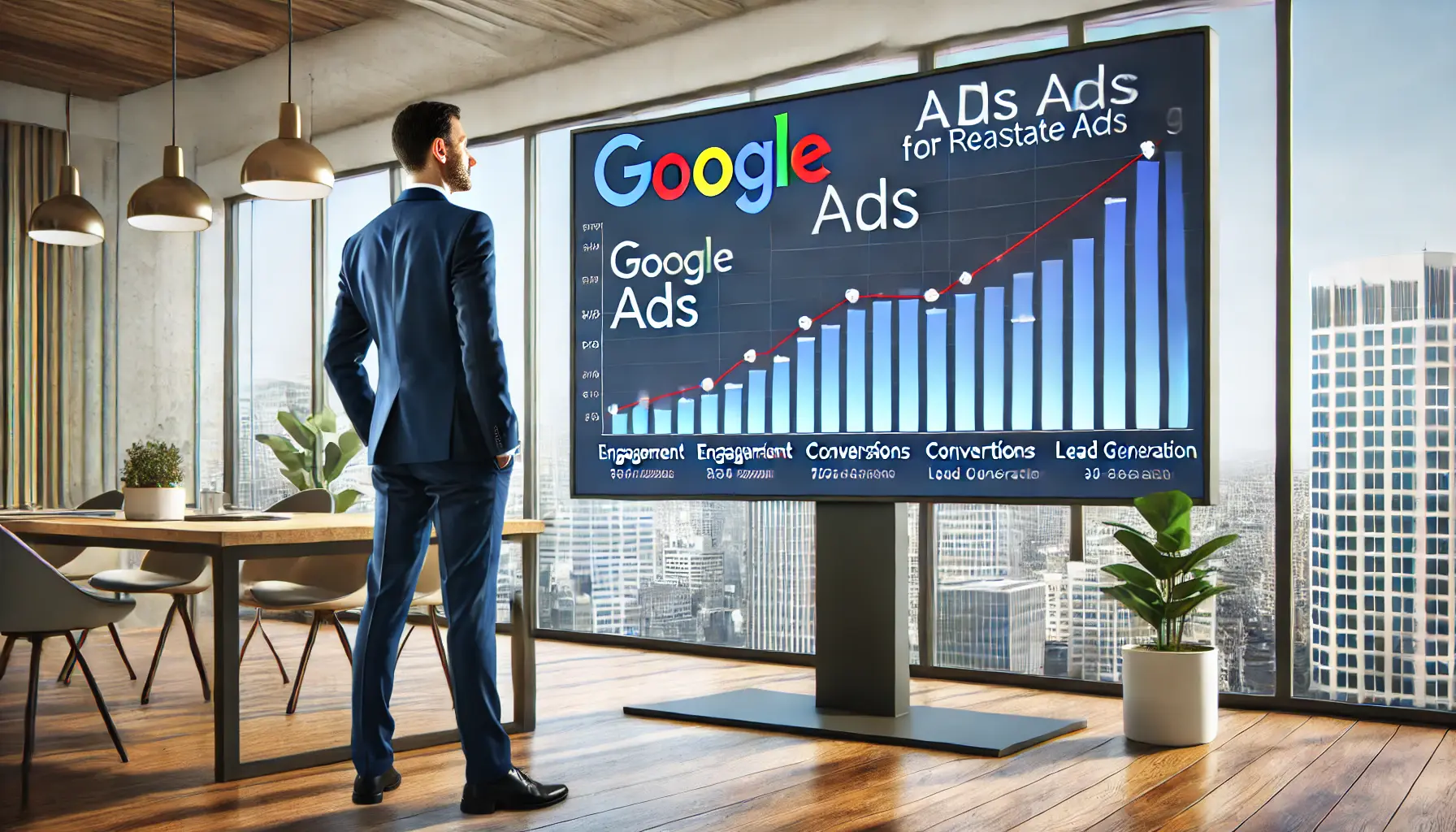The competitive world of real estate is a market where standing out among others is a must.
In real estate, it’s about building relationships and trusting future buyers and sellers.
Today’s digital-first world is mostly untouched by the application of traditional marketing in targeting an appropriate audience.
This is the point where Google Ads has become a vital tool for real estate agents.
By leveraging the power of targeted advertising, you can reach potential clients at the precise moment they’re searching for properties or real estate services, ensuring your listings get maximum exposure.
This article dives into the tactics and strategies that make Google Ads an essential component of any real estate agent’s marketing toolkit.
- Why Google Ads are Essential for Real Estate Agents
- Setting Up a Successful Google Ads Campaign for Real Estate
- Keyword Strategies for Real Estate Google Ads
- Optimizing Landing Pages for Real Estate Google Ads
- Monitoring and Optimizing Your Real Estate Google Ads Campaign
- Mastering Google Ads for Real Estate Success
- Google Ads for Real Estate: Frequently Asked Questions
Why Google Ads are Essential for Real Estate Agents
Google Ads gives real estate agents an unparalleled opportunity to reach a highly targeted audience directly.
Unlike traditional methods of advertising, Google Ads ensures your budget is spent reaching people actively searching for properties, making it one of the most cost-effective marketing strategies available.
But why exactly should real estate agents consider Google Ads essential for their business?
Let’s explore the reasons.

The future of real estate marketing with cutting-edge digital advertising tools.
Digital Advertising: The Real Estate Market in the Future
The real estate industry has taken a massive turn towards digital in recent years.
Buyers nowadays initiate their property searches online, and Google forms a very important part of that.
Digital advertising helps real estate agents to be found where their audience is spending most of their time: online.
By embracing Google Ads, agents can ensure their properties appear at the top of such searches for increased lead capture and deal closure.

Using Google Ads to target and capture high-quality leads in real estate marketing.
How Google Ads Can Drive Targeted Leads
One of the most powerful aspects of Google Ads is its targeting capabilities.
As a real estate agent, you can create campaigns that focus on specific demographics, locations, and even user behaviors.
For example:
- Target ads to users searching for “homes for sale in [city name].”
- Use geotargeting to focus on neighborhoods or regions where you operate.
- Implement audience segmentation to reach first-time buyers or luxury home seekers.
This level of precision ensures your ads are seen by the right people at the right time, significantly boosting your chances of generating high-quality leads.

Highlighting the advantages of Google Ads over traditional marketing for real estate.
Benefits of Google Ads Over Traditional Marketing Methods
Traditional marketing methods like newspaper ads, billboards, or flyers have limited reach and often fail to provide measurable results.
In contrast, Google Ads offers:
- Immediate Visibility: Your ads appear the moment your campaign is live.
- Measurable ROI: Performance can be measured through the tracking of clicks, impressions, and conversions.
- Cost Efficiency: Pay per click, assuring that every dollar in the budget is utilized effectively.
- Scalability: Adjust campaigns based on budget and goals.
Through Google Ads, real estate agents realize better results with less waste.

Showcasing the tangible success of Google Ads campaigns in real estate marketing.
Real-Life Success Stories of Google Ads Campaigns in Real Estate
Scores of real estate agents have used Google Ads to change their businesses.
For example, one agent specializing in high-end homes in a very competitive market created highly targeted ads featuring professional property images and location-based keywords.
In just a few months, they reported a 40% increase in qualified leads and closed several high-value sales directly attributed to their campaigns.
These results represent the power of a well-run Google Ads strategy.
As you can see, Google Ads offers unparalleled opportunities for real estate agents to reach an audience and achieve measurable successes.
Next, we’ll touch on how to set up a successful Google Ads campaign from the perspective of the real estate industry.
Google Ads provides a cost-effective way for real estate agents to reach highly targeted audiences actively searching for properties, maximizing ROIReturn on Investment, a measure of the profitability of an investment relative to its cost. and lead quality.

Setting up a Google Ads campaign in a professional real estate office setting.
Setting Up a Successful Google Ads Campaign for Real Estate
Embarking on a Google Ads campaign can significantly enhance your visibility as a real estate agent.
However, success hinges on meticulous planning and execution.
Let’s delve into the essential steps to establish an effective campaign tailored to the real estate sector.

undefined
Choosing the Right Campaign Type for Real Estate Agents
Google Ads offers a range of campaign types, each serving different objectives.
Real estate agents should choose the right type:
- Search Campaigns: These ads appear in Google search results when users query relevant keywords. They are ideal for capturing prospects actively searching for properties or real estate services.
- Display Campaigns: Visually appealing ads displayed across Google’s network of websites. They are ideal for building brand awareness and retargeting previous website visitors.
- Local Services Ads: Designed for service-based businesses, these ads highlight your services to local prospects with a greater emphasis on proximity and reliability.
Align your campaign type with your specific goals, whether it’s lead generation, brand visibility, or local client acquisition.

Strategically identifying and targeting the right audience for real estate marketing through data analysis.
Identifying and Targeting Your Ideal Audience
Understanding your target audience is crucial.
Consider the following:
- Demographics: Age, income level, family status, and other important characteristics.
- Geographic Location: Focus on specific cities, neighborhoods, or zip codes where you operate.
- Interests and Behaviors: Identify potential clients who spend much of their time online, such as searching for real estate or moving services.
Utilize Google’s audience targeting tools to refine your reach, ensuring your ads connect with those most likely to engage with your services.

Crafting ad copy to enhance engagement in real estate marketing campaigns.
Creating Compelling Ad Copy for Maximum Engagement
Your ad copy should be clear, concise, and compelling.
To craft effective ads:
- Highlight Unique Selling Propositions (USPs): Emphasize what sets you apart, such as specialized local knowledge or exclusive property listings.
- Include Strong Calls-to-Action (CTAs): Prompt immediate action with wording such as “Schedule a Viewing Today” or “Contact Us for a Free Consultation.”
- Use Relevant Keywords: Your ad copy should include keywords reflecting the intent of the user’s search.
Remember, your ad is often the first impression potential clients have of your services; make it count.

Strategizing to optimize budget and maximize ROI for real estate marketing.
Setting a Budget and Optimizing ROI
Budget management is a crucial part of running a successful campaign.
Consider the following:
- Determine Your Daily Budget: Decide how much you’re willing to spend each day based on your overall marketing budget.
- Choose a Bidding Strategy: Options include cost-per-click (CPC), cost-per-thousand impressions (CPM), or cost-per-acquisition (CPA). Select one that aligns with your campaign goals.
- Monitor and Adjust: Regularly review your campaign performance metrics. Adjust bids and budgets to optimize for the best return on investment.
By carefully managing your budget and continually optimizing your campaign, you can maximize your ad dollars and achieve your marketing objectives.
Setting up a successful Google Ads campaign requires strategic planning and ongoing management.
You are in a better position to attract and convert potential clients by choosing the right campaign type, targeting your audience correctly, writing compelling ad copy, and managing your budget effectively.
Effective planning and execution are key to a successful Google Ads campaign tailored to the unique needs of the real estate market.

undefined
Keyword Strategies for Real Estate Google Ads
Implementing effective keyword strategies is crucial for real estate agents aiming to maximize the impact of their Google Ads campaigns.
By selecting and utilizing the right keywords, you can attract high-quality leads actively searching for real estate services.
Let’s explore key strategies to enhance your campaign’s performance.

Strategically researching and selecting effective keywords for real estate Google Ads campaigns.
Researching Effective Keywords for Real Estate
Start by determining some of the keywords that prospective clients would use to search for real estate services.
Use tools such as Google’s Keyword Planner to identify relevant terms.
Pay attention to:
- Location-Based Keywords: Include specific cities, neighborhoods, or zip codes that target local searches, such as “homes for sale in [city name].”
- Property Type Keywords: Add words like “condos,” “apartments,” or “single-family homes” to appeal to particular buyer interests.
- Buyer Intent Keywords: Use phrases indicating readiness to purchase, such as “buy a house” or “real estate listings.”
Regularly updating your keyword list ensures alignment with current market trends and search behaviors.

Leveraging long-tail keywords to attract serious buyers in real estate marketing.
Using Long-Tail Keywords to Attract Serious Buyers
Long-tail keywords are longer, more specific phrases that, while having lower search volumes, often lead to higher conversion rates.
Examples include:
- “Luxury waterfront homes in [city name]”
- “Affordable starter homes near [landmark]”
These keywords attract serious buyers with clear purchasing intentions, reducing competition and cost-per-click.

Refining Google Ads campaigns by strategically using negative keywords to avoid irrelevant clicks.
Negative Keywords: Avoiding Irrelevant Clicks
Implementing negative keywords prevents your ads from appearing in irrelevant searches, saving budget and improving click-through rates.
For instance, if you don’t handle rentals, add “rent” or “rental” as negative keywords to avoid attracting unsuitable traffic.

Evaluating the impact of different keyword match types for Google Ads campaigns in real estate marketing.
Keyword Match Types and Their Impact on Campaigns
Google Ads has different keyword match types that determine how closely a user’s search must match your keyword for your ad to appear:
- Broad Match: Ads may show for searches related to your keyword, offering the widest reach but less precision.
- Phrase Match: Ads appear for searches that include the exact phrase or close variations, providing a balance between reach and relevance.
- Exact Match: Ads show only for searches that match the exact keyword, offering the highest precision but limited reach.
Select match types based on your campaign goals to control ad visibility effectively.

Refining real estate marketing strategies by analyzing keyword performance data.
Analyzing Keyword Performance to Refine Strategies
Regular analysis of keyword performance is essential.
Monitor metrics such as:
- Click-Through Rate (CTR): Indicates how often people click your ad after seeing it.
- Conversion Rate: Measures the percentage of clicks that result in desired actions, like form submissions or calls.
- Cost Per Click (CPC): The average amount you pay for each click.
Use these insights to adjust bids, pause underperforming keywords, and optimize your campaign for better results.
By using these keyword strategies, real estate agents can better their Google Ads campaigns to attract qualified leads and improve conversion rates.
- Use location-based keywords to attract local buyers.
- Leverage long-tail keywords for better targeting and higher conversions.

Optimizing landing pages for real estate Google Ads to enhance user experience and conversions.
Optimizing Landing Pages for Real Estate Google Ads
As a real estate agent, your landing page serves as the first impression for potential clients arriving from your Google Ads campaigns.
An optimized landing page can significantly enhance user experience, increase engagement, and boost conversion rates.
Let’s explore key strategies to ensure your landing pages effectively convert visitors into leads.

Designing responsive and easy-to-navigate landing pages for real estate marketing.
Designing User-Friendly and Mobile-Responsive Pages
Today, most users access a website from their mobile devices.
The landing page has to be user-friendly and mobile-responsive.
Consider the following:
- Responsive Design: Your landing page should seamlessly adapt to different screen sizes.
- Intuitive Navigation: Make navigation simpler for your users by having clear menus with prominent call-to-action (CTA) buttons guiding the customer toward desired actions.
- Fast Loading Times: Optimize images and minimize code to reduce loading times, as slow pages can deter potential clients.
By prioritizing user experience, you increase the likelihood of visitors staying on your page and engaging with your content.

Ensuring content is both compelling and relevant for effective real estate marketing.
Crafting Compelling and Relevant Content
The content on your landing page should resonate with your target audience and align with the ad that directed them there.
To achieve this:
- Clear Headlines: Use concise and attention-grabbing headlines that show the value proposition of your services.
- Engaging Visuals: Add high-quality images or videos of properties to make visitors stay longer and create a visual appeal.
- Concise Descriptions: Include only the most important information about the properties or services offered, without overwhelming the visitor with too much text.
Relevant and interesting content keeps visitors interested and makes them want to take the next step.

Optimizing landing pages with strong calls-to-action to increase engagement in real estate marketing.
Implementing Strong Calls-to-Action (CTAs)
Effective CTAs are crucial for guiding visitors toward conversion.
To create compelling CTAs:
- Action-Oriented Language: Use verbs that prompt immediate action, such as “Schedule a Viewing” or “Get a Free Consultation.”
- Visibility: Place CTAs prominently on the page, ensuring they stand out through contrasting colors or strategic placement.
- Clarity: Clearly state what the visitor will receive upon clicking, setting accurate expectations.
Well-crafted CTAs can significantly increase the likelihood of visitors converting into leads.

Building trust and credibility in real estate marketing with key trust signals on landing pages.
Incorporating Trust Signals to Build Credibility
Building trust is essential in the real estate industry.
Incorporate trust signals on your landing page to establish credibility:
- Client Testimonials: Showcase positive feedback from satisfied clients to demonstrate your reliability and success.
- Certifications and Awards: Display any industry certifications or awards to highlight your professionalism and expertise.
- Secure Badges: If applicable, include security badges to reassure visitors that their information is safe.
Trust signals can alleviate concerns and encourage visitors to engage with your services.

Ensuring consistency in design and messaging between ads and landing pages for seamless real estate marketing.
Ensuring Consistency Between Ads and Landing Pages
Consistency between your Google Ads and landing pages is vital for a cohesive user experience.
To maintain consistency:
- Message Match: The headline and content of the landing page should deliver on the promises made in the ad.
- Visual Continuity: Similar imagery and branding elements should be used to create a seamless transition from ad to landing page.
- Relevance: Users should be taken to landing pages that better match their search intent and, therefore, are more likely to convert.
Consistency enhances user trust and satisfaction, leading to higher conversion rates.
By instituting such strategies, real estate agents will be able to optimize their landing pages in the best way to convert visitors from Google Ads into valuable leads and subsequent business.
Well-designed landing pages enhance user experience, build trust, and significantly improve lead conversion rates.

Optimizing a real estate Google Ads campaign based on performance data and key metrics.
Monitoring and Optimizing Your Real Estate Google Ads Campaign
As a real estate agent, launching a Google Ads campaign is just the beginning.
To ensure sustained success and maximize return on investment (ROI), it’s essential to continuously monitor and optimize your campaigns.
Let’s explore key strategies to enhance your advertising efforts.
Tracking and analyzing key performance metrics to optimize Google Ads campaigns in real estate.
Tracking Key Performance Metrics
Regularly analyzing performance metrics provides insights into your campaign’s effectiveness.
Focus on:
- Click-Through Rate (CTR): The percentage of users who click on your ad after seeing it. A high CTR indicates that your ad copy is engaging for your audience.
- Conversion Rate: Measures the number of clicks resulting in desired actions, such as form submissions or calls. This reflects lead quality.
- Cost Per Click (CPC): The average amount you pay for each click. Monitoring CPC helps manage your budget effectively.
- Quality Score: Google’s assessment of your ad’s relevance and quality. A higher Quality Score can lead to lower costs and better ad placements.
Utilize Google Ads’ reporting tools to access these metrics and identify areas for improvement.

Using A/B testing to refine and optimize real estate marketing strategies for continuous improvement.
Conducting A/B Testing for Continuous Improvement
A/B testing involves designing multiple variations of your ads or landing pages to determine which version performs better.
Test variations in:
- Ad Copy: Experiment with different headlines, descriptions, and calls-to-action to find the most effective wording for your audience.
- Visual Elements: Use various images or videos to assess their impact on engagement.
- Landing Page Layouts: Try new layouts or reorient existing elements to optimize usability and conversions.
By systematically testing and analyzing results, you can refine your strategies for optimal performance.

Optimizing bids and budgets to improve performance in real estate marketing campaigns.
Adjusting Bids and Budgets Based on Performance
Effective budget management is crucial for maximizing ROI.
Consider the following:
- Bid Adjustments: Increase bids for high-performing keywords to enhance visibility and decrease bids for underperforming ones to conserve budget.
- Budget Allocation: Allocate more funds to campaigns or ad groups that generate the most conversions.
- Dayparting: Analyze performance data to identify peak engagement times and adjust your ad schedules accordingly.
Regularly reviewing and adjusting your bids and budgets ensures your resources are invested where they yield the best results.

undefined
Utilizing Remarketing Strategies to Re-Engage Prospects
Remarketing allows you to target users who have previously interacted with your website but didn’t convert.
By implementing remarketingA strategy that targets users who have previously visited a website or interacted with an advertisement. strategies, you can:
- Increase Brand Recall: Keep your services fresh in the minds of potential clients as they continue their property search.
- Encourage Return Visits: Retargeted ads entice users to revisit your site and encourage them to take action.
- Improve Conversion Rates: Re-engaging interested prospects often results in higher conversion rates compared to first-time visitors.
Setting up a remarketing campaign allows you to successfully nurture leads through the decision-making process.
In conclusion, your real estate Google Ads campaigns will only be successful if you monitor and optimize them continuously.
By tracking key metrics, performing A/B tests, adjusting bids and budgets, and using remarketing strategies, you can achieve your marketing goals and improve your advertising efforts.
Continuous monitoring and optimization of performance metrics ensure sustained success and improved ROI for Google Ads campaigns.

Mastering Google Ads to achieve real estate marketing success through effective campaigns.
Mastering Google Ads for Real Estate Success
As a real estate agent, mastering Google Ads can be a game-changer for your business.
This comprehensive guide has covered everything you need to know to create, manage, and optimize your campaigns effectively.
By implementing the strategies discussed, you can attract high-quality leads, build lasting client relationships, and achieve a strong return on investment.

Reviewing key takeaways and actionable insights for real estate marketing success.
Key Takeaways for Real Estate Agents
In this article, we’ve covered the key areas involved in using Google Ads to achieve success in real estate marketing.
Let’s recap those key points below:
- Understanding the Importance: Google Ads is a tool that helps real estate agents reach potential buyers and sellers with effectiveness no other traditional method of marketing can offer at a lower cost.
- Strategic Setup: The selection of the right campaign type, identification of your ideal audience, and creation of appealing ad copy form the very foundation of any successful endeavor in this area of marketing.
- Keyword Optimization: Finding effective keywords, applying long-tail keywords, and using negative keywords can help increase the precision and performance of campaigns.
- Landing Page Excellence: Optimizing landing pages with user-friendly designs, relevant content, strong calls-to-action, and trust signals can increase conversions.
- Continuous Monitoring: Tracking performance metrics, conducting A/B testing, adjusting bids, and implementing remarketing strategies ensure campaigns remain effective and adaptive.

The transformative impact of Google Ads on real estate marketing performance.
How Google Ads Transforms Real Estate Marketing
Google Ads provides real estate agents with unparalleled opportunities to connect with their audience at the right time.
By leveraging advanced targeting options, agents can ensure their ads reach serious buyers and sellers, driving meaningful engagements and higher conversion rates.
The flexibility of Google Ads allows agents to adapt their strategies to market trends, ensuring their campaigns remain competitive and relevant.
Whether it’s through remarketing, precise geotargetingA digital marketing strategy that focuses advertisements on users in specific geographic locations., or optimizing keywords, the platform empowers agents to maximize their marketing efforts effectively.

Taking proactive action to drive real estate success through data-driven Google Ads campaigns.
Taking Action for Real Estate Success
To harness the full potential of Google Ads, real estate agents should focus on implementing the strategies discussed in this article:
- Set clear goals for your campaigns and make sure they align with your general marketing objectives.
- Invest in keyword research and audience segmentation to target the right prospects.
- Continuously track the performance of the campaigns and make data-driven adjustments to optimize results.
- Optimize landing pages for an engaging and smooth user experience.
- Utilize remarketing to convert returning visitors into customers.
With these steps, you are sure to set up yourself as one of the best-performing real estate agents in your marketplace and establish a strong online presence with Google Ads.
In the end, Google Ads is not just a marketing tool; it acts as a catalyst for growth and success in today’s competitive real estate industry.
By following these tried-and-true strategies and continuing to refine your approach, you can unlock new opportunities to connect with your audience and achieve your business goals confidently.
By implementing proven strategies and continuously refining campaigns, real estate agents can leverage Google Ads as a powerful growth catalyst.

Exploring frequently asked questions to optimize Google Ads strategies for real estate marketing.
Your campaigns can be managed by an agency specialized in Google Ads, check out our service page.
Google Ads for Real Estate: Frequently Asked Questions
Following are a few questions that real estate agents commonly ask when using Google Ads to establish an online presence in their field of operations.
Google Ads enable real estate agents to reach potential clients actively searching for properties, offering targeted advertising, measurable results, and cost-effective lead generation.
Utilize location-based keywords and geotargeting features in Google Ads to focus your campaigns on specific cities, neighborhoods, or zip codes where your potential clients are searching.
Search campaigns are ideal for capturing prospects actively searching for properties, while display campaigns can enhance brand awareness and retarget previous website visitors.
Conduct thorough keyword research using tools like Google’s Keyword Planner to identify location-based, property type, and buyer intent keywords relevant to your target audience.
Optimized landing pages provide a seamless user experience, align with ad content, and include strong calls-to-action, significantly increasing the likelihood of converting visitors into leads.
Track key performance indicators such as click-through rate (CTRClick-Through Rate, the percentage of users who click on an ad after seeing it.), conversion rate, cost per click (CPCCost Per Click, the amount an advertiser pays for each click on their advertisement.), and quality scoreA metric used by Google Ads to assess the relevance and quality of keywords, ads, and landing pages. to continually evaluate and improve your campaign’s efficiency.
Remarketing targets individuals who have already visited your website, keeping your services front-of-mind and encouraging users to revisit the site.
This often results in increased conversions.
Regularly review and adjust your campaigns based on performance data, ideally on a weekly or bi-weekly basis, to ensure they remain effective and aligned with your marketing goals.
Yes, Google Ads allows you to set daily budgets and bid strategies that align with your financial constraints, enabling effective advertising even with limited resources.












